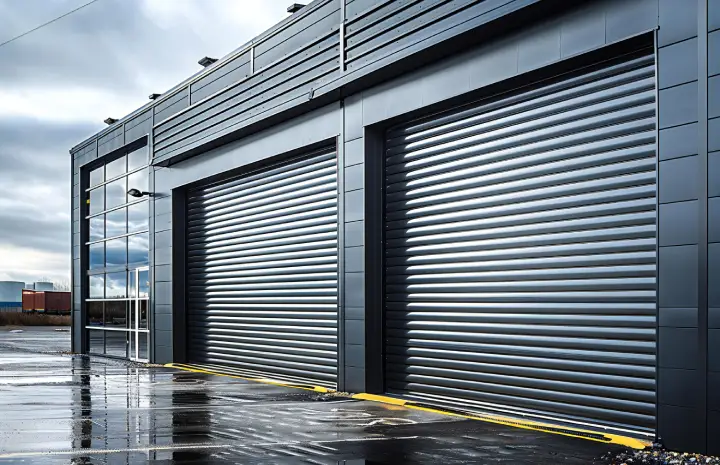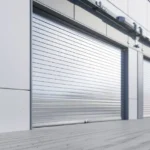Best Warehouse Door Installation Choices for Modern Warehouses
Warehouses are the backbone of modern businesses, serving as critical storage and distribution hubs. To keep them efficient, secure, and accessible, the choice of doors plays a vital role. The right warehouse door doesn’t just provide entry and exit—it ensures safety, supports energy efficiency, enhances durability, and helps maintain smooth operations.
Among the many options available today, aluminium warehouse door installation is increasingly becoming the preferred choice for modern facilities. Lightweight, durable, and resistant to corrosion, aluminium doors offer a practical solution for warehouses of all sizes. In this blog, we’ll explore the best warehouse door options for modern warehouses and explain why aluminium stands out as a top choice.
Why Door Selection Matters for Warehouses
A warehouse door is not just a barrier; it’s an essential part of day-to-day operations. Here’s why choosing the right door is so important:
- Security: Protects valuable goods and prevents unauthorized access.
- Durability: Handles constant usage and withstands harsh conditions.
- Energy Efficiency: Helps maintain indoor climate, especially for temperature-sensitive goods.
- Productivity: Smooth opening and closing mechanisms save time during high activity.
- Aesthetics: Modern warehouses also value professional, clean appearances that reflect business quality.
Types of Warehouse Doors
When considering the best installation choices, several door types dominate the warehouse industry. Let’s look at the most popular ones:
1. Aluminium Warehouse Doors
Aluminium is lightweight yet strong, resistant to rust, and requires minimal maintenance. Aluminium warehouse door installation is ideal for facilities seeking durability with a sleek, modern look.
Benefits:
- Rust and corrosion resistance.
- Lightweight, reducing wear on hardware.
- Easy to operate and maintain.
- Excellent lifespan in humid or coastal environments.
2. Steel Warehouse Doors
Steel is another popular choice for heavy-duty applications. It offers unmatched strength but is prone to rust without proper coating.
Benefits:
- High security against break-ins.
- Long lifespan with protective finishes.
- Good for industrial warehouses handling heavy operations.
3. Sectional Overhead Doors
These doors are made of multiple panels that slide upward, saving space and improving accessibility.
Benefits:
- Great for facilities with limited space.
- Customizable in aluminium, steel, or insulated options.
- Easy to automate for modern operations.
4. Roll-Up Doors
Roll-up doors are a common sight in commercial and industrial settings. They coil tightly above the door opening, requiring minimal space.
Benefits:
- Compact design ideal for high-traffic warehouses.
- Can be made from aluminium for corrosion resistance.
- Quick and smooth operation.
5. High-Speed Fabric Doors
Used for warehouses where rapid movement is critical, these doors improve workflow and control indoor temperatures.
Benefits:
- Extremely fast opening and closing speeds.
- Ideal for food, pharmaceutical, or climate-controlled warehouses.
- Reduces energy loss.
Why Aluminium Warehouse Door Installation is the Best Choice
While several options exist, aluminium consistently emerges as one of the best solutions for modern warehouses. Here’s why:
1. Lightweight Yet Durable
Unlike steel, aluminium is light but doesn’t compromise on strength. This makes it easier for employees to operate while reducing strain on hinges, rollers, and opening mechanisms.
2. Corrosion Resistant
Dubai and other coastal regions face high humidity levels that can cause steel to rust. Aluminium, however, is naturally resistant to corrosion, making it ideal for long-term use.
3. Low Maintenance
Aluminium doors require less upkeep compared to wooden or untreated metal doors. Regular cleaning and occasional lubrication are usually enough.
4. Energy Efficiency
Aluminium doors can be insulated to regulate internal warehouse temperatures, helping reduce energy bills.
5. Professional Appearance
Modern warehouses are not just storage spaces; they reflect the brand’s professionalism. Aluminium doors provide a sleek, polished look that enhances a company’s image.
Key Considerations Before Choosing a Warehouse Door
To make the best decision for your facility, keep these factors in mind:
- Size of Warehouse: Larger warehouses may need sectional or roll-up aluminium doors.
- Type of Goods Stored: Temperature-sensitive goods require insulated doors.
- Budget: Aluminium offers a balance between affordability and long-term value.
- Frequency of Use: High-traffic areas benefit from durable, easy-to-operate options.
- Security Needs: For high-value goods, reinforced aluminium or steel doors may be preferred.
Professional Installation vs. DIY
When it comes to warehouse doors, installation quality matters just as much as the material. While DIY may seem appealing, professional installation ensures:
- Precise fitting for smooth operation.
- Proper insulation and sealing.
- Safe handling of heavy components.
- Warranty on workmanship and materials.
For long-lasting results, always opt for professional aluminium warehouse door installation services.
Cost of Aluminium Warehouse Door Installation
Pricing depends on the size, design, and customization required. On average:
- Small Roll-Up Aluminium Door: AED 2,000 – AED 4,000
- Large Industrial Aluminium Door: AED 5,000 – AED 12,000
- Customized Solutions: Higher, depending on automation and insulation features.
While aluminium doors may cost slightly more upfront than basic steel options, they save money in the long run through reduced maintenance and longer lifespan.
Maintenance Tips for Aluminium Warehouse Doors
To maximize lifespan, follow these care tips:
- Clean doors monthly to prevent dust buildup.
- Lubricate hinges, rollers, and tracks every six months.
- Inspect seals for wear and replace when necessary.
- Schedule professional servicing annually.
- Avoid overloading doors with unnecessary weight or force.
Future Trends in Warehouse Door Installations
Modern warehouses are increasingly integrating smart technology into door systems. Expect to see:
- Automated Aluminium Doors: Remote or sensor-based operation.
- Energy-Efficient Designs: Better insulation and eco-friendly materials.
- Hybrid Materials: Aluminium combined with reinforced alloys for extra strength.
- Smart Security Features: Integration with surveillance and access control systems.
Final Thoughts
Choosing the right warehouse door is critical for security, efficiency, and long-term cost savings. While multiple options exist, aluminium warehouse door installation remains one of the best choices for modern warehouses. With durability, corrosion resistance, energy efficiency, and sleek design, aluminium doors provide the perfect balance between practicality and professionalism.
By combining the right material with professional installation, warehouses can achieve maximum efficiency, improved safety, and long-lasting value.




